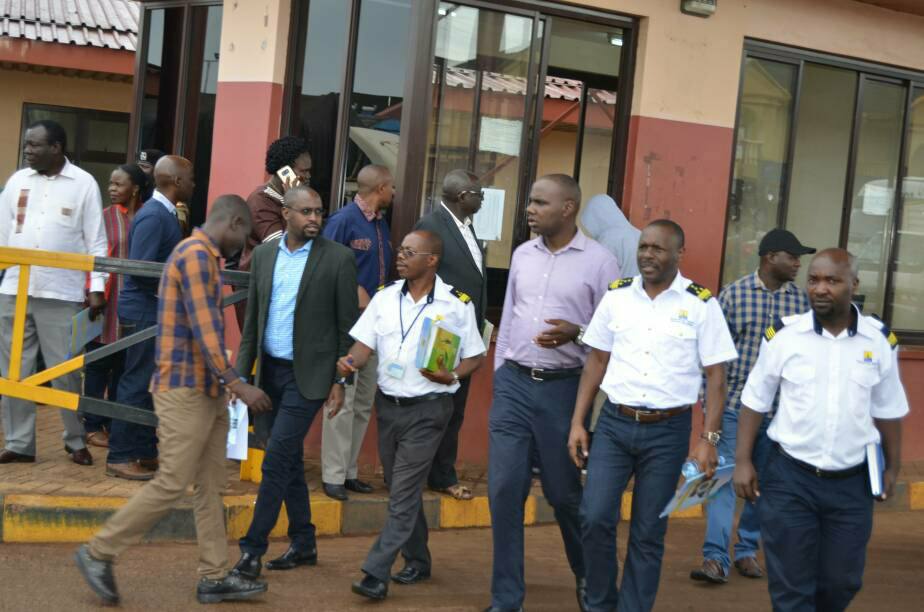South Sudan’s warring parties that have signed an agreement on peace and governance should commit to its implementation and not use it as a window for preparing for war, President Museveni has advised.
President Museveni, who is one of the two guarantors of the agreement, gave the counsel yesterday (Sunday) evening at the signing ceremony held at the Friendship Hall in Khartoum, Sudan. The other guarantor is Sudanese President Omar-al Bashir.
“This should be the last signing. I really hope that this time the respective parties in South Sudan are serious and they don’t use the ceasefire as tactical instruments of preparing for war,” said President Museveni.
Sunday’s signing, seen as the climax of an IGAD-led process meant to restore peace to the restive country, was marked with ululation, song and chant, especially when the two principal signatories, President Salva Kiir and Dr. Riek Machar, either greeted or spoke to each other.
But even as the different groups celebrated the pact, President Museveni said it was important to reflect on the motive of the war in the first place and ask if it was worth it.
“We are congratulating ourselves over many dead bodies in South Sudan over the last four years. This is not good. We are signing but we must ask, was this a just or unjust war! All the actors in this war must ask whether it was a just war,” he told the attentive audience.
He cautioned that politics driven by opportunism had brought a lot of suffering to Africa and cost it development.
“In the last 58 years, I have been watching the Africans here. There have been so many mistakes, so much suffering because of politics of opportunism; opportunism that takes advantage of identity. It is the problem you see in Somalia, people fighting on clan lines,” he said, adding, “so much time lost, development stalled because of hawia (identity). People fighting because they are Muslims or Christians, Shia or Sunni! Rubbish. A lot of rubbish. We should be bold and stop being diplomatic about this.”
The President advised that leaders should instead focus more on working for the fulfillment of their people’s interests like peace, health, education and creating conducive environment to do business.
Referring to one of the sticking issues in South Sudan, the land question, President Museveni cautioned against pseudo-ideology, guiding that leaders must do more strategic thinking.
“Even in some of these discussions you hear people are not expanding their horizons. For instance, you find tribes are fighting for land. Peasants with backward methods of production are fighting for land which they do not add value to. They just transfer backwardness from Point A to Point B. The healthier migration should be from rural to town, from farm to factory.”
He pointed out that many advanced countries like the USA have a small population (just 2%) involved in agriculture while the bulk is in industry and services sectors.
“When you cause trouble over tribal agriculture, are you saying you will stay backward forever? Do not kill each other just because of agriculture,” he said.
Case for elections & neighbours
Whereas political arguments and disagreements will always exist, President Museveni noted, the right “medicine” must be found for it.
“Medicine for political arguments is fair elections. When you argue, let the population arbitrate and choose whose argument they buy in a fair election. This should be done peacefully.”
The President also said the agreement had exposed the wrong architecture of peace-making as advanced by some international agencies.
“In such a war, the first victims are the South Sudanese and then the neighbours. But these groups had said Uganda and Sudan must not be anywhere close to the South Sudan issue. Well, finally someone thought we could come in and help. We were no longer blacklisted.”
Peace effort, said President Museveni, must be like the Christian Trinity, involving the three levels of internal players, regional players and the international players. “You can’t forget the regional players,” he said.
Bashir speaks
Host President Omar al-Bashir thanked President Museveni for supporting the South Sudan peace process, saying all its nationals were looking forward to peace in their country.
He said whereas no party had gotten everything they wanted in the negotiations, they should compromise for the sake of peace.
“You must compromise. You must have one unified Parliament and one Police Force. We wish this to be implemented. We shall support you. Arms should only be carried by the security personnel. This is the best solution for African problems,” he said.
President Bashir assured the delegates that the pumping of petroleum in Unity State would resume with effect from next month to help jumpstart South Sudan’s struggling economy, adding that Khartoum would help rebuild Juba’s damaged infrastructure.
Kiir’s take
While committing to enforcing the implementation of the peace agreement, President Kiir reflected on the damage caused by the war, saying it had crippled Africa’s youngest nation.
“The war was senseless. It killed our people, destroyed our economy and left our people more divided than before. While leaders of other countries are confronting development challenges and working for peace, we in South Sudan are making a fool of ourselves, destroying our young country,” he said.
To applause from the delegates, President Kiir said, “I assure you that the agreement we have signed marks the end of war in South Sudan. Whatever we have agreed to, will be respected. We shall now concentrate on the timely implementation of the Agreement and I am ready to dialogue with anyone.”
Giving a light parting shot, he said the expanded Parliament and Cabinet would require him to buy them new cars yet the country did not have the money.
Machar’s view
The leader of SPLM in Opposition, Dr Riek Machar, said peace was the only choice left to the parties in South Sudan but hastened to ask IGAD and the guarantors to ensure what has been agreed on is implemented to the letter.
Kenyan President, Uhuru Kenyatta and the Djiboutian leader, Ismail Omar Guelleh, also witnessed the signing ceremony. The UN Secretary General and the African Union Commission Chairperson sent representatives.
















